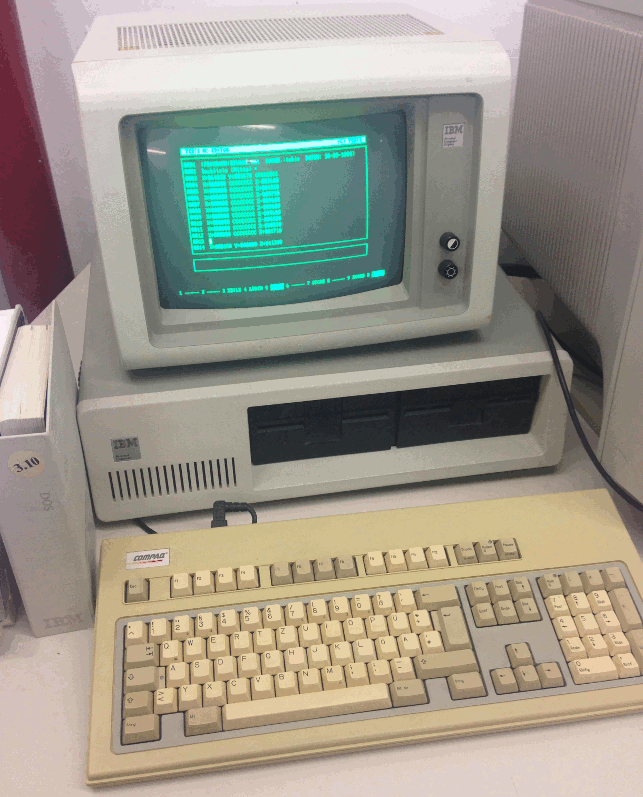In case you’ve missed it, coding is big news. Apparently it’s the new literacy. Tanya Weaver takes a look at the ‘Hour of Code’ campaign and wonders if more of us should be learning how to code and not just leaving it to kids
In May I jetted out to Munich for a couple of days as Tebis, a software company that develops CAD/CAM systems, was hosting an open house in celebration of its 30th anniversary.
The event didn’t only focus on the present and future technologies but also where the company has come from by way of the ‘Tebis Museum’.
This room showed a progression from old to new technologies including the very first computer that Tebis’ CEO used when he started the company in the early 1980s.
Although it looks like a fossil by today’s standards, it’s pretty incredible to think that this was just 30 years ago! Over the years, the computer has lost weight, changed from grey into an array of colours, has a screen that offers more than just green and black and has undergone many style makeovers.
Just to prove how unrecognisable this grey great grandfather is, is to put it in front of children who have grown up swiping, scrolling and clicking. In fact, a very funny seven minute video was posted onto youtube recently entitled ‘Kids React to Old Computers’, which is part of a series by Fine Brothers Productions (watch it here).
It shows a range of kids aged between seven and thirteen reacting to a computer from the late 70s/early 80s. Pretty similar to this Tebis one in fact. Their reactions are priceless and the video has gone viral being viewed more than 10 million times in just two weeks.
Some of the kids had no idea that it was a computer and were very surprised when they were told. “It doesn’t look like anything we have now,” said one of the boys. They were guffawing and poking fun at its large size, on/off switch, green text, floppy disk and lack of mouse.
Of course, this computer would have also not been connected to the internet because the internet hadn’t been invented yet. This really shocked the kids with one girl saying “but how do you look up homework?”
The internet turned 25-years-old on 4 March 2014 and in celebration code.org, a non-profit organisation dedicated to expanding participation in computer science education by making it available in more schools, launched the ‘Hour of Code’ on the same day.

The first computer that ‘Tebis’ CEO Bernhard Rindfleisch used when he started his company just 30 years ago
If you’ve missed it, coding is big news. Everyone’s doing it. It’s the new literacy apparently. So much so that as of September 2014 coding will be part of the School Curriculum in England and taught to children from as young as five.
So, to get teachers and parents up to speed, the Hour of Code offers online tutorials on its website with the aim of teaching the basics of computer programming in 60 minutes in a fun, simple way. Tutorials include things like writing lines of code to get an Angry Bird to catch a little piggy or using Scratch (your guess is as good as mine) and a Raspberry Pi computer to control a blinking LED.
code.org has many partners and supporters who have jumped on the coding band wagon including our favourite Technology Messiah will.i.am but there’s also the inventor of the internet himself, Tim Berners Lee, who has this to say about the campaign: “Learning to code gives you a completely new perspective when you look at a computer.
Before, you think of it as an appliance — like a fridge — accepting what it can do. After, you know that you can code that computer to do anything you can imagine it doing. That’s a massive change…and a massive challenge!”
Although we may not like to admit it, computers do run our lives. And as Berners Lee says, if you can programme that computer to do what you want, that’s where the future lies. Even Stephen Hawking, another code.org supporter, says, “Whether you want to uncover the secrets of the universe, or you just want to pursue a career in the 21st century, basic computer programming is an essential skill to learn.”
Apart from those frantic teachers who have a few months left to learn how to code in order to teach it in the classroom before September, should the rest of us be taking lessons and tutorials too?
Many think that we should. Arguing that it’s a valuable and marketable skill that will increase your work speed and help you come up with creative solutions whatever your job. If you can speak basic ‘code language’ it means you can communicate better with your company’s developers or programmers and, of course, those children from the video earlier, who will be entering the job market in a few years, will no doubt be fluent in it.
So time to learn your ABCs (that’s code for Always Be Coding).
Should we be taking lessons in coding and not just leaving it to kids?
Default






